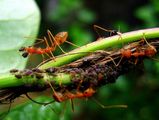NIMBioS Tuesday Seminar Series
In conjunction with the interdisciplinary activities of the National Institute for Mathematical and Biological Synthesis (NIMBioS), a seminar series will be hosted at NIMBioS every other Tuesday at 3:30 p.m. in the NIMBioS Lecture Hall on the 4th floor of 1534 White Ave., Suite 400 Seminar speakers will focus on their research initiatives at the interface of mathematics and many areas of the life sciences. Light refreshments will be served starting at 3 p.m.

Time/Date/Location: 3:30 p.m., Sept. 22, NIMBioS Lecture Hall, 1534 White Ave., Suite 400
Speaker: Dr. Sharon Bewick, NIMBioS Postdoc
Topic:Modeling Local Community Responses to Climate Change
Abstract:
I will be talking about the development of a mechanistic mathematical framework that models both competitive and mutualistic interspecific interactions with the goal of interpreting community dynamics and altered community structure under a warming regime. In particular, I will focus on climatic change as it affects ant communities in the temperate forests of eastern North America. To that end, the primary interspecific interactions that I will be discussing will relate to competition between ants for food resources. Previous models have considered competitive interactions between ants in terms of dominance-discovery tradeoffs. Certainly, global climate change may perturb both the dominance relationships between species and/or the discovery abilities of individual species, and this may have predictable consequences on community composition. More recently, however, several empirical studies have suggested that a dominance-thermal tolerance tradeoff may be more important than a dominance-discovery tradeoff, at least in the temperate forests of eastern North America. With this tradeoff, the impact of global climate change is even more obvious. I will therefore discuss the development of mechanistic mathematical models that capture the features of dominance-thermal tolerance tradeoffs and the possibility of using these models to predict community composition, both under current climatic conditions and under a warming regime. Finally, I will briefly touch on aspects related to modeling the impact that the ant community has on the plant community through ant-plant seed dispersal mutualisms.
NIMBioS
1122 Volunteer Blvd., Suite 106
University of Tennessee
Knoxville,
TN 37996-3410
PH: (865) 974-9334
FAX: (865) 974-9461
Contact NIMBioS


